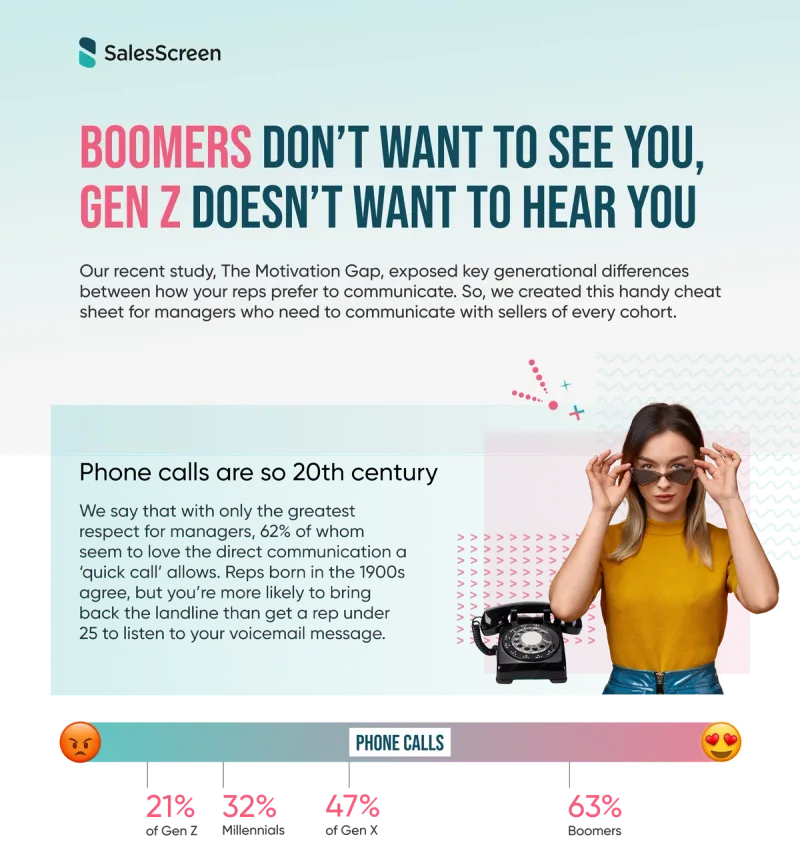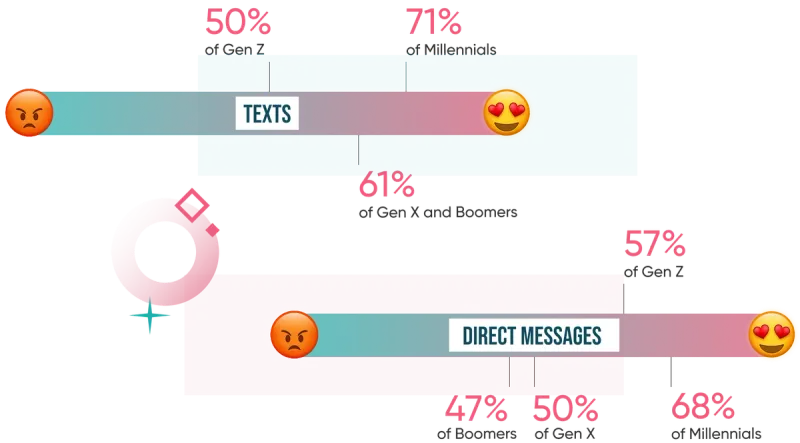
How to Motivate Different Generations in Sales (Gen Z, Millennials, and Beyond)
Learn how to motivate Gen Z, Millennials, and older generations in your sales team with tailored strategies that increase engagement, recognition, and results.
0 min read.
Sales teams today bring together four generations, each with their own communication styles, feedback preferences, and motivational triggers. You might have a Gen Z sales rep dialing on their first job, a Millennial rep closing multi-year contracts, a Gen X sales manager leading with grit, and a Baby Boomer sales director who’s seen every market cycle play out.
That diversity is powerful. But it also means traditional motivational strategies that once worked for “most” no longer work for all.
You can't just run the same leaderboard contest or quarterly bonus and expect everyone to care or engage equally. Generational values around feedback, recognition, autonomy, and growth have changed. The smart sales leaders are those who adapt fast.
Let’s break down what motivates each generation in sales and how to create a performance culture that helps everyone succeed.
Why generational motivation matters in sales
What motivates one rep might actually demotivate another. When motivation doesn’t evolve with your team, engagement suffers—and that’s not just a soft metric.
Gallup research shows that employees who feel strongly recognized are 4× more likely to be engaged, and companies with engaged employees see 23% higher profitability. That impact is even more pronounced for Gen Z and Millennials, who have come to expect feedback loops that are fast, frequent, and personalized. Recognition is a powerful motivator, and it works differently across generations. That's why managers who want to unlock full-team performance need to lead with flexibility, not assumptions.
And across generations, those values differ:
- Gen Z craves fast-paced feedback loops and mission-driven goals
- Millennials thrive on autonomy, development, and social recognition
- Gen X values independence and long-term rewards
- Baby Boomers are motivated by mentorship opportunities, legacy-building, and being respected for their experience
Failing to reflect these nuances often leads to stalled performance, high turnover, and an unclear culture. And with Gen Z set to make up 27% of the global workforce by 2025 (McKinsey), understanding these dynamics is now critical, not optional.
How do you motivate Gen Z in sales?
Gen Z has redefined what motivation means at work. Born into a feedback loop of likes, comments, and real-time updates, they expect their workplace to function with the same speed and clarity. But here's where motivation and communication are deeply connected: Before you can motivate Gen Z effectively, you need to reach them in the way they prefer to communicate.
How Gen Z communicates:
According to SalesScreen's Motivation Gap report:
- Only 21% of Gen Z prefer phone calls
- They are far more likely to respond to direct messages, short-form updates, and in-app nudges
- They value feedback that is instant, visual, and personalized
So if Gen Z isn't responding to your voicemail or calendar invite, it's not a lack of motivation; it's a communication mismatch.

What motivates Gen Z?
- Real-time praise delivered via Slack, Teams, or platforms like SalesScreen
- Gamified micro-goals that create short-term momentum and engagement
- Purpose alignment—they want to know how their work aligns with the company's mission
- Clear growth paths that show how skills today unlock future opportunities
To truly motivate Gen Z, start with the right message in the correct format, then layer on mission, growth, and real-time feedback.
How do you motivate Millennials in sales?
Millennials now make up the largest segment of the global workforce. They’re collaborative, driven, and very comfortable with digital tools. But traditional motivators, like quarterly bonuses or rigid recognition programs, often miss the mark. They want ownership, growth, and meaning. As with Gen Z, motivation is tightly linked to how you communicate.
How Millennials communicate:
SalesScreen’s data shows:
- 71% prefer texting or messaging over phone calls
- 68% rank direct messages as a top communication method
- Only 22% prefer in-person meetings
Millennials want clarity without formality, and communication that feels personal but not performative.

What motivates Millennials?
- Opt-in challenges and peer-based competitions that foster autonomy
- Visible progress through dashboards and team updates
- Social recognition, like Slack shoutouts or standup spotlights
- Meaningful ownership, such as mentoring, leading playbook projects, or running initiatives
Motivation sticks when Millennials feel they’re part of the process, not just recipients of it. And it all starts with communication that respects their time, autonomy, and need for transparency.
Are Gen X and Boomers motivated differently?
As Gen X reps become senior members of the team, and Boomers round out legacy careers, the ways they want to be recognized are different, but no less important.
Where Gen Z may love emojis, Boomers prefer direct appreciation through email (63%, according to SalesScreen data). They’re professionals, and they expect to be treated as such.
Gen X falls somewhere in the middle. They’re tech-capable but skeptical of fluff. They’ve seen the cycles and want performance systems that respect their independence.
What Motivates Gen X and Boomers:
- Longer-term rewards like milestone celebrations, tenure bonuses
- Coaching-led recognition, such as feedback from managers, not just peers
- Mentorship visibility that highlights knowledge-sharing and impact
- An inclusive culture that doesn't sideline experience in favor of novelty
These reps may not be looking for flashy leaderboards or emojis, but they do want to know they're respected and seen. Recognition that reflects their legacy and leadership (e.g., mentoring newer representatives and consistently hitting numbers) goes a long way.
How can you motivate a multi-generational sales team without creating division?
- Rotate contest formats. Mix team-based challenges with solo sprints. Let reps opt in. Alternate between short-term targets and long-term missions.
- Personalize dashboards. Gen Z wants streaks. Millennials want momentum. Boomers want clarity. Show them their data in a way that resonates with their values.
- Diversify recognition styles. Private coaching. Public shoutouts. Peer-to-peer nominations. Email kudos. You don’t need to pick one, just make sure recognition flows across multiple channels.
- Build shared rituals. Use weekly win recaps, Slack MVPs, or sales huddles to create shared emotional moments that cross generational preferences.
- Optimal communication styles that make every generation feel included in the performance culture.
- Gen Z = Slack
- Millennials = Direct messages
- Gen X = Email
- Boomers = Structured meetings
Motivation doesn't have to mean different rules for different people; it just means flexibility, empathy, and visibility for everyone.
Don't motivate sales teams by guesswork
Motivating a multi-generational team is about leading smarter, recognizing what drives each person, and giving them space to thrive.
Here’s what to remember:
- Lead with layered motivation, not one-size-fits-all contests
- Match recognition to what each generation values
- Flexibility is the foundation of modern performance strategy
- Use tools that optimize and personalize performance
SalesScreen is built for sales leaders who want to drive performance through motivation. It helps you motivate Gen Z, Millennials, and beyond, with real-time recognition, custom missions, and performance visibility that fits every rep. Want to see it in action? Request a personalized walkthrough.







